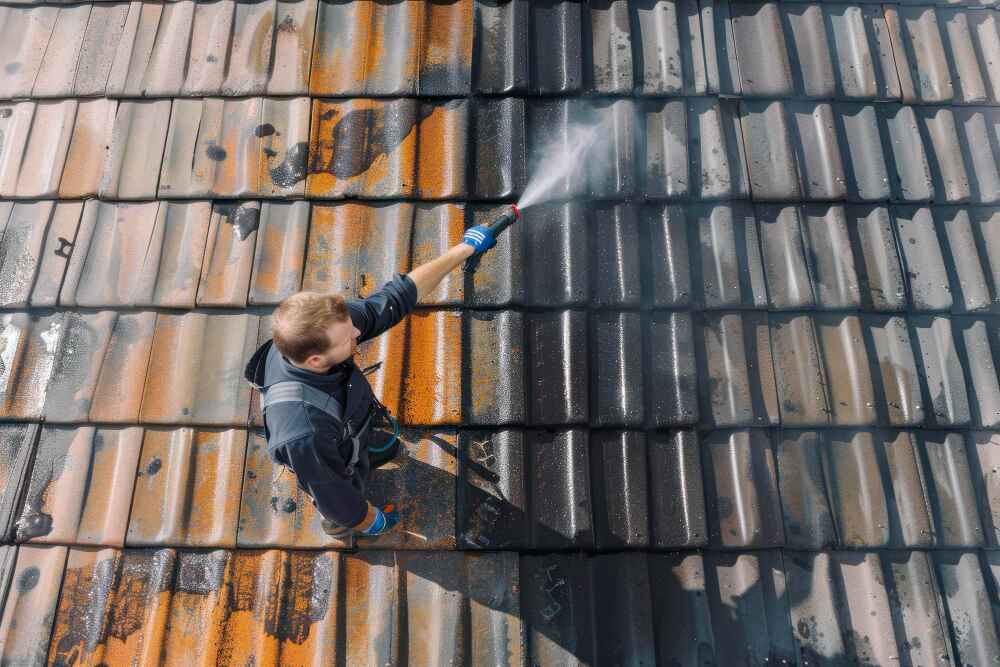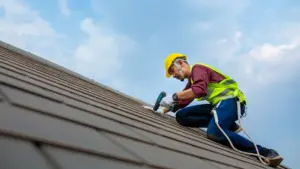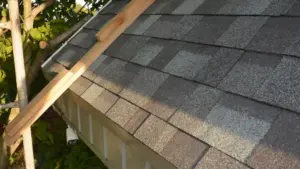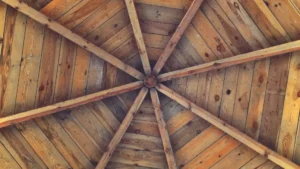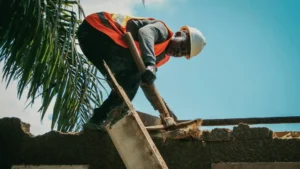If your home features a cement tile roof, you’ve already made a smart, stylish, and durable roofing choice. Cement tiles are tough, energy-efficient, and long-lasting. But even the strongest roof needs regular care. For a broader overview of upkeep across different roofing types, check out our Types of Roofing Materials Maintenance guide. That’s where cement tile roof cleaning comes in—essential not just for beauty, but for preserving your roof’s performance over time.
In this complete guide, you’ll learn everything about roof cement cleaning, how to safely wash tile roofs, when to call a professional, and how to prevent buildup that damages your investment.
Whether you’re researching cleaning concrete roofs or simply wondering if it’s time for a wash, you’re in the right place.
Why Cement Tile Roof Cleaning Is a Must
Cement tiles, like all roofing materials, accumulate dirt, mildew, algae, and lichen over time. Left untreated, these elements cause discoloration, erosion, and can even compromise waterproofing.
Top Benefits of Regular Cement Tile Roof Cleaning:
Restores curb appeal and brightens your home’s exterior
Prolongs the life of cement tiles by removing damaging growths
Prevents water absorption and structural damage
Increases property value and resale appeal
Complies with some home insurance and HOA requirements
A clean roof isn’t just about looks—it’s about roof preservation. This applies to other materials too, including shingle roofs, metal roofs, and rubber roofing systems, all of which benefit from regular care.
Signs Your Cement Tile Roof Needs Cleaning
Wondering if it’s time to clean your tile roof? Here are a few telltale signs:
Green, black, or brown streaks on the tiles (algae, mold, or lichen)
Moss patches or raised growths
A chalky appearance from weathering
Clogged or overflowing gutters
Tiles appear dull or dusty even after rain
If you spot any of these, it’s time to act. The longer debris or organisms stay on your roof, the harder they are to remove.
How to Clean a Cement Tile Roof: Step-by-Step Process
Cleaning a cement tile roof requires care, knowledge, and the right equipment. Here’s how to do it safely and effectively.
Step 1: Safety First
Wear non-slip shoes
Use a fall-protection harness
Choose a dry day with minimal wind
Secure your ladder properly
Tile roofs can be slippery, and tiles are brittle when walked on carelessly. Always use roof walk pads if you must step on the tiles.
Step 2: Remove Loose Debris
Use a soft broom or leaf blower to remove leaves, twigs, and dirt.
Focus on roof valleys and beneath overhangs where buildup occurs.
Avoid metal tools that can scratch the tile’s surface or break edges.
Step 3: Pre-Treat With a Cleaning Solution
Apply a roof-safe detergent to break down mold, mildew, and organic stains. Look for eco-friendly, non-corrosive formulas made for tile roof cleaning.
DIY Option:
Mix:
1 gallon of water
1 cup white vinegar
A few drops of mild dish soap
Apply using a pump sprayer. Let it soak for 15–30 minutes to loosen buildup.
Step 4: Gentle Scrubbing (If Needed)
Use a long-handled, soft-bristle brush to scrub stained areas. Avoid high pressure or scraping, which can chip or break tiles.
Step 5: Rinse Thoroughly
Using a garden hose or pressure washer (on LOW setting), rinse from top to bottom. Avoid spraying water underneath tiles to prevent leaks.
Should You Pressure Wash Cement Tile Roofs?
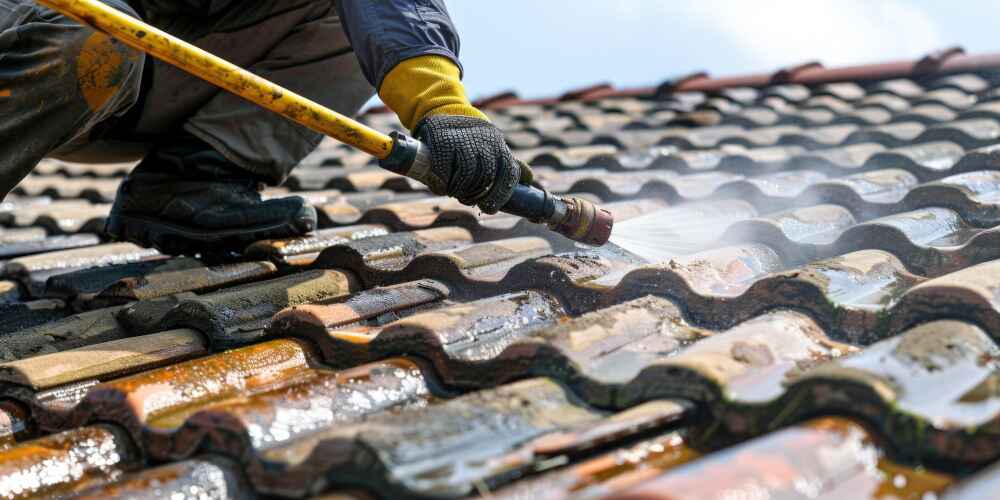
Yes—but with caution.
Concrete roof tiles are tough but not invincible. A pressure washer can help remove heavy buildup, but use a wide-angle tip and stay under 1200 PSI. It is recommended that you use only water with the pressure never exceeding, especially on concrete tile systems.
Too much pressure:
-
Breaks tiles
-
Strips protective sealants
-
Forces water into the underlayment
If you’re unsure, it’s best to hire professionals trained in cleaning concrete roofs safely.
Best Practices for Cement Roof Tile Maintenance
Regular maintenance means less need for deep cleaning and fewer repairs.
Cement Tile Roof Care Tips:
-
Schedule roof inspections twice a year
-
Keep trees trimmed to reduce shade and organic growth
-
Clean out gutters every season
-
Apply a roof tile sealant every 3–5 years
-
Watch for cracked tiles and replace them immediately
Just like standing seam metal roofs need specific care, cement tile roofs thrive with a tailored maintenance plan.
What NOT to Do When Cleaning a Cement Tile Roof
Avoid these common mistakes during roof cement cleaning:
-
Don’t use bleach—it can etch tiles and kill plants
-
Avoid metal brushes or wire tools
-
Don’t walk directly on tiles without weight-distribution pads
-
Never use high-pressure washing without proper training
-
Don’t clean in extreme heat or freezing temperatures
Using improper techniques not only voids warranties but can drastically reduce roof life.
Professional Cement Tile Roof Cleaning: Is It Worth It?
Absolutely. While DIY cleaning is possible, hiring a certified professional brings peace of mind. Experts in cement tile roof cleaning bring:
-
Specialized equipment (roof-safe ladders, sprayers, pads)
-
Non-toxic cleaning agents
-
Tile inspection and minor repair skills
-
Experience navigating different roof slopes safely
For homeowners who’ve also installed asphalt shingle roofs on other structures or have slate roof sections, hiring pros helps manage all surfaces in one service call.
How Often Should Cement Tile Roofs Be Cleaned?
On average, schedule cement tile roof cleaning every 2–3 years depending on:
-
Climate: humid areas = more algae
-
Tree coverage: more shade = more moss
-
Roof pitch: flatter roofs = more buildup
If your home is in a coastal or tropical area, annual cleaning may be necessary to combat salt, humidity, and vegetation.
Eco-Friendly Roof Cleaning Options
If you’re environmentally conscious, consider these eco-safe cleaning alternatives. For detailed eco‑friendly tile treatments and tile-specific cleaning techniques, check our reference on safe cleaning & preserving tile roofs.
-
Vinegar + water mix (best for light mildew)
-
Oxygen bleach (a safer alternative to chlorine bleach)
-
Citrus oil cleaners (biodegradable and plant-safe)
Pro tip: Avoid runoff onto garden beds. Use tarps or temporary drain diverters during tile roof cleaning.
Maintenance Schedule for Cement Tile Roofs
| Task | Frequency |
|---|---|
| Visual inspection | Twice a year |
| Gutter cleaning | Every season |
| Roof washing | Every 2–3 years |
| Reapply sealant | Every 3–5 years |
| Replace cracked tiles | As needed |
Just like RV rubber roofs require different seasonal maintenance, your cement tile roof will thrive with scheduled care.
FAQs: Cement Tile Roof Cleaning
Q: Can I clean my cement tile roof myself?
A: Yes, with the right safety gear, tools, and cleaning solution. However, hiring a professional is safer and ensures proper technique.
Q: What is the best cleaner for concrete tile roofs?
A: Use biodegradable, roof-specific cleaners. Avoid bleach or acid-based products, which can degrade the surface.
Q: Will cleaning my tile roof damage the tiles?
A: Not if done correctly. Use low-pressure rinsing and avoid walking on tiles or using abrasive tools.
Q: How much does professional cement tile roof cleaning cost?
A: Prices range from $300–$800, depending on roof size, pitch, and buildup severity.
Q: Can I paint or seal my cement tile roof after cleaning?
A: Yes, sealing helps protect tiles from moisture, moss, and UV damage. Reapply sealant every 3–5 years.
Related Maintenance Guides
Explore more expert subpages from our main guide:
- How Do You Clean a Shingle Roof
- Rubber Roof Maintenance
- Slate Roof Replacement
- Metal Roof Maintenance
- Best Roof Shingles
- Roof Cleaning Chemicals
- RV Rubber Roof Maintenance
- Wood Shake Roof
- Concrete Tile Roof Maintenance
Explore the full Roofing Maintenance Hub for tailored advice on your specific roofing material.
Conclusion: Keep Your Cement Tile Roof Clean and Strong
Routine cement tile roof cleaning isn’t just a cosmetic choice—it’s a necessary investment in the health and longevity of your home. From DIY cleaning to professional solutions, knowing when and how to clean your roof can prevent thousands in repairs down the road.
By sticking to a consistent schedule, avoiding harsh chemicals, and using proper tools, you’ll keep your tiles looking fresh and functioning flawlessly for decades.

